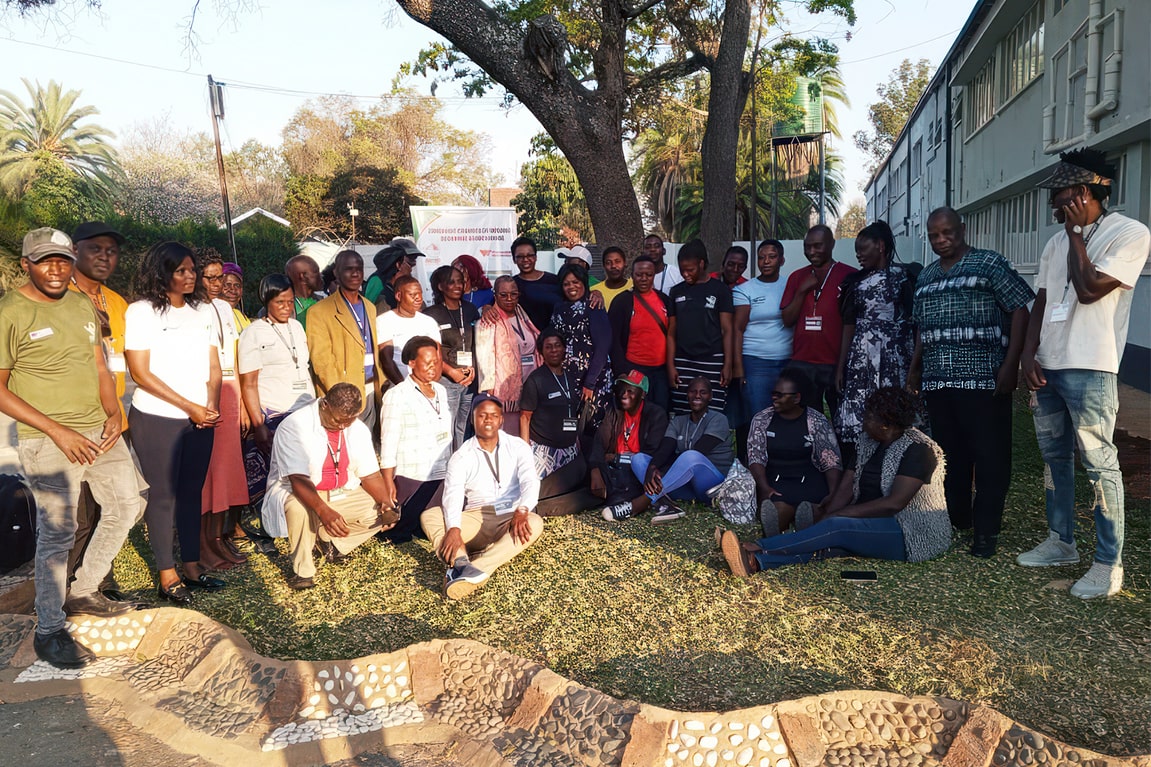Subscribe to our E-Letter!
Subscribe to our e-mail and stay up-to-date with news and resources from street vendors around the world.
A delegation of StreetNet worker leaders participated in the 44th Southern Africa Development Community (SADC) People’s Summit, on 15-16 August 2024 held in Harare, Zimbabwe. At the heart of Southern Africa’s development and economy lies the group that forms the backbone of many economies—informal economy workers.
StreetNet was able to amplify its advocacy efforts for the rights of informal economy workers. Additionally, the communique included specific commitments to support and protect informal economy workers, marking a significant step forward for the movement. The delegation representing StreetNet was formed by worker leaders from Malawi, Lesotho, Zambia and Zimbabwe, as a host organization. Comrades from Lesotho and Malawi participated in panel discussions on the impact of mining on the community of the region.
The perspective of informal economy workers shaped the final policy demands in various domains, contained in the communique available on the official website. Such demands are not only strictly pertaining to labor issues, but extended to social protection, urban design and democratic governance.

The final document also emphasized the need for social protection systems tailored to the needs of informal economy workers. By extending social security, healthcare, and other benefits to those in the informal economy, SADC countries can reduce poverty and inequality while boosting economic stability. This move would not only recognize the contributions of informally employed workers but also protect their rights and improve their quality of life.
A significant recommendation from the Peoples’ Summit was the establishment of a regional gender-sensitive urban design manual. This manual would guide the planning of inclusive markets, particularly for women, youth, and people with disabilities who dominate the informal economy. Inclusive urban planning is essential to ensuring that all members of society, regardless of their economic status, can benefit from economic opportunities. In particular, it is essential for workers engaging in the public space, such as street vendors, and for their right to decent working conditions.
Of particular importance for informal economy workers’ movements is the freedom of association in trade unions or other democratic entities. Such freedom is protected by the ILO Core Convention on “Freedom of Association and Protection of the Right to Organize”, also known as Convention 87. The Convention states the prohibition of forced labor, the right to collective bargaining, and the right for organizations to be free of influence from authorities. Informal economy workers, not recognised as a legitimate part of the workforce in the majority of the countries, are often prevented from self-organization and do not enjoy the freedom of association. The Peoples’ Summit urged to “Repeal laws that restrict freedoms of expression, assembly, and association to ensure the safety of human rights defenders and establish a task force to review and revise restrictive laws affecting civil society and human rights defenders”.
The Communique highlights progress in regional trade policies, particularly the introduction of a simplified trade regime between Malawi, Mozambique, and Tanzania. However, it emphasizes the need for Southern African Development Community (SADC) countries to better prepare for the implementation of the African Continental Free Trade Area (AfCFTA). This preparation includes capacity building, policy harmonization, and infrastructure development to ensure that the benefits of increased trade are widespread across the region. The communique also calls for creating One-Stop Border Posts (OSBP) to streamline and expedite the free movement of goods and people within the region. This last provision is particularly important for informal traders whose freedom of movement is often restricted by excessive bureaucratic burden. One-stop border posts and simplified trade regimes are generally regarded as a practical solution to improve working conditions of traders in the informal economy.
The Peoples’ Summit represents the voice of social movements, religious movements, women’s rights groups, human rights defenders and other constituencies in the Southern Africa Region. The final document represents a common agenda for the people of the region to advocate for their needs, especially for the most marginalized groups. It can also become a useful advocacy tool at regional and local levels for street vendors and informal economy workers to strengthen their voices and emphasize on their essential role in both local and national economies.
“I am proud of the delegation and how our comrades participated. Our contribution was reflected in the final communiqué”, said Lorraine Sibanda, StreetNet’s International President, also a ZCIEA President. “We have shared our demands with the leaders of the region. We have to project our strength and become even more united. We will become even more visible, in our pursuit to change our lives and to ingrain decent work into the informal economy”.
For more information and quotes on the Peoples’ Summit, you can visit the YouTube channel of ZCIEA, our affiliate in Zimbabwe.

By entering your personal data and clicking “Suscribe,” you agree that this form will be processed in accordance with our privacy policy. If you checked one of the boxes above, you also agree to receive updates from the StreetNet International about our work